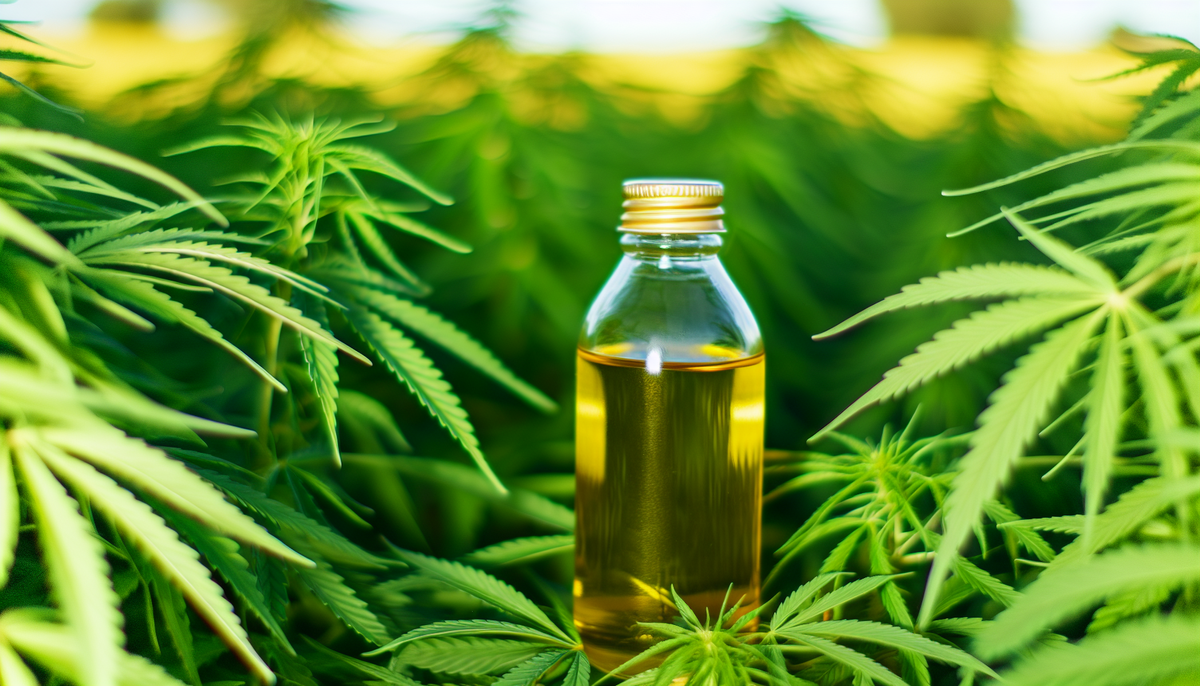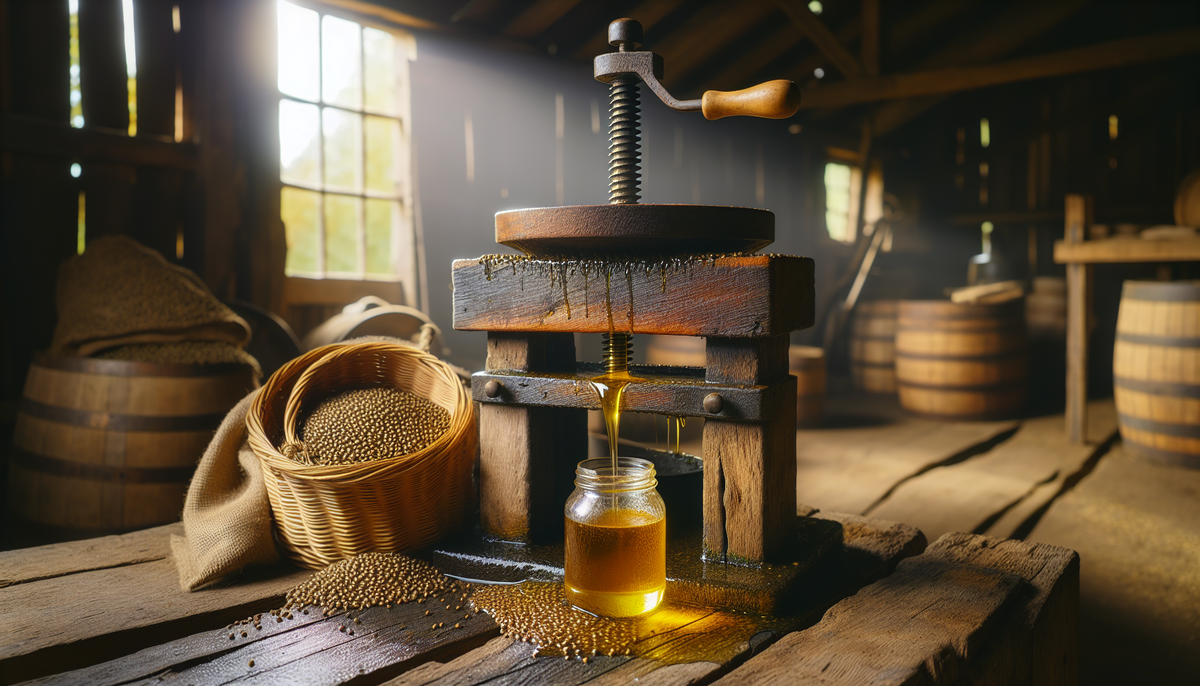CBD Hemp Seed Oil: Benefits, Uses, and Market Evolution
Written by: Hunter Podell, Subject Matter Expert and Website Founder
Published: March 15, 2024; Last updated: April 6, 2024
- 1. Key Takeaways
- 2. Unraveling the Essence of CBD Hemp Seed Oil
- 2.1 Defining CBD Hemp Seed Oil
- 2.2 The Composition Breakdown
- 3. The Extraction Journey: From Plant to Oil
- 3.1 Cold Pressing Hemp Seeds
- 3.2 Infusing CBD
- 4. Comparing Hemp Oil and CBD Oil
- 4.1 Cannabinoid Content Variance
- 4.2 Diverse Applications
- 5. The Health Benefits of Consuming Hemp Seed Oil with CBD
- 5.1 Heart Health and Fatty Acids
- 5.2 Synergistic Effects on the Body’s Natural Balance
- 6. Therapeutic Uses: CBD Hemp Seed Oil in Action
- 6.1 Pain Relief and Anti-Inflammatory Properties
- 6.2 Dermatological Treatment and Skin Disorders
- 7. Culinary Creations: Incorporating CBD Hemp Seed Oil in Food
- 7.1 Flavorful and Nutritious Recipes
- 7.2 Best Practices for Cooking with CBD Hemp Seed Oil
- 8. Regulatory Landscape: Understanding the Legal Status of CBD Hemp Seed Oil
- 8.1 Industrial Hemp Regulations
- 8.2 CBD Product Compliance
- 9. Navigating the Market: Choosing Quality CBD Hemp Seed Oil Products
- 9.1 Reading Labels and Certificates of Analysis (COA)
- 9.2 Identifying Reputable Brands and Retailers
- 10. Summary
- 11. Frequently Asked Questions
- 11.1 What are the benefits of CBD hemp seed oil?
- 11.2 What does hemp CBD oil do for the body?
- 11.3 Is hemp oil and CBD oil the same thing?
- 11.4 Which is better for pain, CBD or hemp?
- 11.5 Does hemp seed oil cause a positive drug test?
- 12. References
CBD hemp seed oil merges the nutritional value of hemp seed oil with the wellness-promoting elements of CBD, providing an option for those seeking holistic health avenues. Here, we break down its benefits, everyday use cases, and the legalities to consider, clarifying how CBD hemp seed oil might fit into your life.
Key Takeaways
CBD hemp seed oil is infused with CBD, an essential oil from the hemp plant. It contains a rich mix of nutrients, including omega-3 and omega-6 fatty acids, essential amino acids, and vitamins and minerals, offering nutritional and therapeutic benefits.
The production of CBD hemp seed oil involves cold pressing hemp seeds and infusing the resulting oil with CBD extract, obtained separately from the hemp plant’s flowers, with the quality of the final product dependent on the extraction methods utilized.
There is a crucial distinction between hemp oil and CBD oil; hemp oil comes from seeds with minimal cannabinoid content, while CBD oil is made from other parts of the hemp plant, contains a higher concentration of cannabinoids, and is associated with therapeutic uses.
Unraveling the Essence of CBD Hemp Seed Oil

CBD hemp seed oil is a powerhouse in the health and wellness industry. At its core, it’s derived from the seeds of the Cannabis sativa plant and is specially infused with CBD, a crucial essential oil obtained from the hemp plant’s leaves and flowers. This unique infusion makes it stand out from plain hemp seed oil, offering an added layer of wellness benefits. So, the next time you shop for hemp seed oil, verify its CBD content by checking the ingredient label. ¹
CBD hemp seed oil’s distinct makeup constitutes a treasure trove of nutrients. It’s loaded with omega-6 and omega-3 fatty acids, essential amino acids, vitamins, and minerals. It boasts 25 times more omegas than olive oil, with no trans fats and 40% less saturated fats. This makes hemp oils, particularly CBD hemp seed oil, ideal for health enthusiasts seeking a nutrient-packed oil.
Linoleic acid ² is the primary fatty acid in hemp seed oil, making up 50-70% of the oil content. This essential fatty acid is known for its benefits for overall health. It also includes gamma-linolenic acid (GLA) and stearidonic acid (SDA), known for their anti-inflammatory properties and as precursors to other omega-3 fatty acids, respectively. Saturated fatty acids such as palmitic acid and stearic acid are present in lower concentrations, making this oil a heart-friendly choice. CBD hemp seed oil is a nutritional powerhouse, with polyunsaturated fatty acids (PUFAs) making up 70-90% of its total content.
Defining CBD Hemp Seed Oil
CBD hemp seed oil is the result of a careful infusion process where CBD, an essential oil from the leaves and flowers of the hemp plant, is added to hemp seed oil. This infusion elevates the oil from a simple dietary supplement to a therapeutic elixir, offering the benefits of hemp seed oil and CBD in one package.
Bear in mind that CBD doesn’t naturally occur in the seeds but is infused after extraction. Therefore, when shopping, always check the ingredient label for CBD or cannabidiol, not just hemp seed ingredients.
The Composition Breakdown
Hemp seed oil is a treasure trove of nutritional compounds, including significant omega-3 and omega-6 fatty acids. These essentials are known for maintaining good health. One of its key components, gamma-linolenic acid (GLA), is a vital omega-6 fatty acid beneficial in treating conditions such as eczema, psoriasis, and other inflammatory diseases. Among various seed oils, hemp seed oil stands out due to its unique properties.
To harness even more benefits, CBD is infused into hemp seed oil, creating a product rich not only in fatty acids but also in cannabidiol.
The Extraction Journey: From Plant to Oil

The journey of CBD hemp seed oil from plant to bottle involves meticulous steps. Several extraction methods exist, including:
Soxhlet
Percolation
Supercritical Fluid Extraction
Ultrasonication
Pyrolysis
Among these, cold pressing is commonly used for extracting hemp seed oil from seeds, resulting in a pure, unadulterated product.
After the oil is extracted, an additional process is used to infuse it with CBD.
Cold Pressing Hemp Seeds
Cold pressing involves pressing the seeds without the use of added heat. This method preserves the nutritional value of hemp seed oil, ensuring the integrity of its omega fatty acids and other nutrients. The oil’s natural flavor, often nutty, is also preserved through cold pressing. ³
The properties of cold-pressed hemp seed oil can vary depending on factors like the growth location of the seeds, the conditions during oil extraction, and the maturity of the seeds. This method makes hemp seed oil suitable for nutritional and skin care applications for human and pet consumption.
Infusing CBD
The magic happens when CBD is infused into hemp seed oil. CBD, extracted from the hemp plant’s floral material, is added to the oil using extracts from its floral material rather than from the seed itself. The extraction methods for CBD are diverse, ranging from mechanical to solvent-based, which have varying impacts on the final product’s concentration and purity.
Common solvents used in CBD extraction include ethanol, supercritical CO2, and natural lipids, which result in different varieties of CBD concentrate. Quality extraction methods using organic, pharmaceutical-grade ethanol or supercritical CO2 can yield higher-quality CBD, essential for creating a premium infused hemp seed oil product.
Comparing Hemp Oil and CBD Oil
Now, it’s crucial to distinguish between hemp oil and CBD oil. While they come from the same plant, the Cannabis sativa, they have different properties and uses. Hemp oil, derived from hemp seeds, typically contains little to no CBD content. It’s renowned for its nutritional benefits, making it a favorite for food and skincare products.
On the other hand, CBD oil is better known for its potential in treating specific conditions such as anxiety and depression. It’s sought after for its therapeutic properties in various treatments.
Cannabinoid Content Variance
In terms of cannabinoid content, hemp oil and CBD oil also differ. Hemp oil from hemp plant seeds contains little to no THC or CBD, which are prevalent in the leaves, stalks, and flowers from which CBD oil is derived. While hemp seed oil may contain trace amounts of cannabinoids like CBD, they are typically in meager quantities that might be almost invisible, unlike CBD oil, which is known for its higher concentration of cannabinoids.
For consumers and those in the industry, it’s essential to differentiate between CBD hemp seed oil and CBD oil, given that the former is derived from seeds with barely any CBD and THC content.
Diverse Applications
When it comes to applications, both oils have their unique roles. Dietary hempseed oil, also known as hemp seed oil, is consumed as a dietary supplement for its rich content in polyunsaturated omega-3 and omega-6 fatty acids, which support cardiovascular health and help reduce inflammation. It’s also popular in beauty products due to its omega-heavy acid content, which significantly benefits skin health and hair care.
CBD oil, on the other hand, is utilized in various products, including topical creams, tinctures, and beauty items, for its potential to improve pain, mood, sleep, and skin health. While hemp seed oil is sought after for its nutritional properties, CBD oil and CBD oils are favored for their possible therapeutic effects on various health issues, demonstrating each oil’s distinct roles in health and wellness.
The Health Benefits of Consuming Hemp Seed Oil with CBD

Ingesting CBD hemp seed oil can provide numerous health advantages. It has been recognized for promoting cardiovascular health by potentially lowering blood pressure, reducing cholesterol levels, and providing anti-inflammatory benefits that support heart and overall well-being. It also contributes to skin health, with CBD’s counteractive effects on oxidative stress helping to treat conditions related to neuronal cell death.
The benefits of CBD hemp seed oil include:
Improving brain and eye development in the baby during pregnancy
Potentially preventing maternal depression
Relief from pain, anxiety, and depression
Improved concentration and energy levels
Heart Health and Fatty Acids
The essential fatty acids in CBD hemp seed oil are a boon for heart health. The oil’s rich content of omega-3 and omega-6 fatty acids contributes to cardiovascular health, regulating blood pressure and reducing inflammation. Regular consumption of hemp seed oil has been linked to lower levels of low-density lipoprotein (LDL) cholesterol in the blood and reduced total cholesterol, decreasing the risk of heart disease. ⁴
While more research is needed, current studies suggest that hemp seed oil may exert a positive influence on heart disease. The combination of omega fatty acids in hemp seed oil coupled with the homeostatic properties of CBD provides synergistic benefits for cardiovascular health and maintains natural bodily balance.
Synergistic Effects on the Body’s Natural Balance
CBD and hemp seed oil work hand in hand to support the body’s natural balance, known as homeostasis. CBD oil interacts with the body’s endocannabinoid system, which manages critical processes like:
appetite
mood
memory
sleep
immune functions
This interaction offers a range of health benefits.
CBD has shown promise in treating diseases connected with oxidative stress and inflammation, often at the root of chronic pain conditions, suggesting its role in enhancing overall well-being.
Therapeutic Uses: CBD Hemp Seed Oil in Action

CBD hemp seed oil is more than a nutritional supplement; it’s also a therapeutic agent. It is effective for:
Pain relief
Reducing inflammation
Alleviating anxiety and stress
Improving sleep quality
Promoting relaxation
It can also be used as a massage oil to reduce pain when rubbed on sore joints.
The oil is also known for addressing inflammation and treating skin disorders, making it a versatile addition to your wellness routine.
Pain Relief and Anti-Inflammatory Properties
CBD oil interacts with the body’s central regulatory system and neurotransmitters, affecting inflammation and pain. Hemp seed oil contains gamma-linolenic acid, an omega-6 anti-inflammatory fatty acid. These anti-inflammatory properties support pain relief and can be applied directly to the affected area. ⁵
The anti-inflammatory benefits of hemp seed oil, when combined with CBD’s effect on neurotransmitters, can synergistically reduce pain and inflammation.
Dermatological Treatment and Skin Disorders
CBD hemp seed oil is also known for its dermatological benefits. Cannabinoids, including CBD found in hemp seed oil, have significant anti-inflammatory properties that can benefit the treatment of skin inflammatory diseases such as psoriasis, atopic dermatitis, and allergic contact dermatitis. The antioxidant properties of CBD are considerable, as CBD exhibits more antioxidant activity than vitamins like α-tocopherol or vitamin C, which are beneficial for skin health, and it reduces oxidative conditions by preventing superoxide radicals that contribute to skin damage.
Oral consumption of hemp seed oil improves symptoms of atopic dermatitis, a type of eczema, owing to its beneficial polyunsaturated fat content. Its non-greasy and absorbent properties make it a suitable topical treatment for eczema and acne. The oil’s ability to control excess sebum secretion, alongside its anti-inflammatory properties, shows potential for acne control.
Cannabidiol (CBD) helps normalize lipogenesis in sebocyte cells and reduces their proliferation, aiding in managing acne vulgaris.
Culinary Creations: Incorporating CBD Hemp Seed Oil in Food

Were you aware that CBD hemp seed oil could provide a tasty and healthful enhancement to your food? You can incorporate it into various dishes for not only flavor enhancement but also the nutritional benefits it offers. Some ideas for using CBD hemp seed oil in your cooking include:
Adding it to salad dressings
Drizzling it over roasted vegetables
Mixing it into homemade hummus
Using it as a marinade for grilled meats
Stirring it into smoothies or yogurt
The possibilities are endless with CBD hemp seed oil.
However, remember that it should ideally be used in ways that do not involve high heat to maintain its beneficial properties.
Flavorful and Nutritious Recipes
Infusing your diet with CBD hemp seed oil can be as simple as transforming it into a delicious salad dressing, functioning like olive oil in combination with lime, balsamic, lemon, salt, and pepper to create a delectable vinaigrette. For a distinctive flavor twist on classic dishes, CBD hemp seed oil is suitable for roasting potatoes and vegetables such as pumpkin, sweet potato, and butternut squash.
For the more adventurous, innovative dishes like a quinoa bowl with mushrooms and cavolo nero or a homemade hummus can be elevated with CBD hemp seed oil, providing a balanced omega fatty acid intake and infusing a nutty flavor.
Best Practices for Cooking with CBD Hemp Seed Oil
When cooking with CBD hemp seed oil, it’s best to avoid high-heat cooking methods like searing, frying, or deep-frying as it has a low smoke point of approximately 325 degrees Fahrenheit. Instead, use it as a finishing ingredient or add it to dishes after cooking to enhance flavor without damaging its nutritional content.
When using CBD hemp seed oil in your cooking, here are some tips to keep in mind:
Choose recipes that don’t exceed the oil’s smoke point to prevent oil quality degradation.
For salad dressings, use a ratio of two parts vinegar to one part CBD hemp seed oil, and consider adding various flavorings for taste enhancement.
Drizzle it over traditional dishes and combine it with seasonings like garlic or chili-garlic paste to add a warm, nutty flavor.
Even homemade condiments like mayonnaise can be elevated by substituting CBD hemp seed oil to infuse unique flavors. And finally, remember to store CBD hemp seed oil in a cool, dark place to help preserve its taste and nutritional properties for extended use.
Regulatory Landscape: Understanding the Legal Status of CBD Hemp Seed Oil
The legality of CBD hemp seed oil varies globally, with some regions fully legalizing its sale and use, whereas others enforce severe restrictions or complete prohibitions. To be legally sold and produced, CBD hemp seed oil must contain less than 0.3% THC in the United States, while in European countries, the THC limit is often set at 0.2%.
Regulatory compliance for CBD hemp seed oil includes:
Ensuring that products align with the legal requirements for dietary supplements or natural health products
Adhering to strict quality control measures
They are testing products by third-party laboratories to confirm their cannabinoid content and that they are contaminants-free.
Producers of CBD hemp seed oil must follow these regulations to maintain compliance.
Industrial Hemp Regulations
Industrial hemp regulations play a significant role in producing CBD hemp seed oil. To be legally sold, hemp seed oil is required to contain less than 0.3% THC, ensuring no psychoactive effects. The 2018 Farm Bill in the United States federally legalized hemp cultivation and removed it from the Controlled Substances Act. Globally, nations have different regulations about industrial hemp cultivation, typically restricted to specific uses like medical and industrial applications.
Several countries have individually legalized hemp cultivation for restricted purposes at various times, including hemp and cannabis plants in:
Japan
The UK
Canada
New Zealand
Russia
Australia
Italy
Israel
Ecuador
Colombia
Manufacturers using hemp concentrate must register with the appropriate regulatory bodies to confirm the potency and purity of their products.
CBD Product Compliance
CBD products, including cosmetics that contain hemp oil or CBD, must comply with regulations that prevent them from suggesting medicinal benefits unless approved and must be clear about their use and content. It is illegal to market any food to which THC or CBD has been added.
Cannabis products derived from the cannabis plant, including those containing CBD, have not been approved by the FDA for the treatment of diseases or conditions, as their safety and effectiveness have not been established for specific health issues. Products designed to have therapeutic or medical uses or that affect the body’s structure or function fall under the drug category according to the FD&C Act and must obtain FDA premarket approval or conform to a particular drug category monograph.
The FDA has clearly stated that:
CBD cannot be sold as a dietary supplement, making it clear that products cannot be marketed using such claims.
For animal products, the FDA has not approved CBD for any use and has issued warnings regarding the safety and effectiveness of these products.
The FDA endorses the IND application pathway as the most effective way to determine which patients could benefit from drugs derived from cannabis, including CBD, advocating for solid scientific research.
Navigating the Market: Choosing Quality CBD Hemp Seed Oil Products
How can a consumer identify a superior product in a crowded market brimming with CBD hemp seed oil items? The key lies in understanding the product’s quality and safety. When purchasing CBD hemp seed oil products, consumers should always verify the product’s quality and safety by checking the Certificate of Analysis (COA).
Reading Labels and Certificates of Analysis (COA)
A reputable CBD product will come with a Certificate of Analysis (COA) that has been third-party tested to signify quality assurance. A COA is a detailed report from an accredited laboratory outlining a CBD product’s chemical makeup. On a product’s COA, consumers should check the cannabinoid profile, the concentration of CBD measured in milligrams per gram, and lab tests for potential contaminants such as heavy metals and pesticides. Consumers tend to trust products with a COA more, representing a stamp of approval from an unbiased third-party laboratory.
The CBD concentration of a product indicated as milligrams per milliliter (mg/mL) on the label, is crucial to assess the potency rather than just the total amount of CBD. For consumer convenience, many states require CBD product labels to have a QR code that links directly to the COA. Consumers should be wary of bold claims on labels and ensure the CBD product has undergone third-party testing before buying.
Asking about a company’s lab results and product testing, along with any additional ingredients in their CBD oil, can provide better knowledge regarding the product’s quality.
Identifying Reputable Brands and Retailers
Trustworthy CBD hemp seed oil sources are characterized by their commitment to quality assurance. Quality manufacturers verify that the CBD concentrations in their hemp seed oil are as advertised and conduct thorough testing to ensure the safety and purity of their CBD hemp seed oil.
Consumers should prioritize checking for evidence of quality assurance when selecting a CBD hemp seed oil brand or retailer.
Summary
CBD hemp seed oil, a fusion of hemp seed oil and CBD, has carved a niche in wellness. This oil offers many nutritional and therapeutic benefits, from its unique extraction process to its diverse applications. CBD hemp seed oil has proven its worth, whether it’s heart health, treating skin disorders, or providing pain relief. Understanding the regulatory landscape and identifying quality products will ensure consumers reap the best benefits as the market evolves. So, why wait? Start your wellness journey with CBD hemp seed oil today!
Frequently Asked Questions
What are the benefits of CBD hemp seed oil?
CBD hemp seed oil has potential benefits, such as reducing the risk of heart disease due to its high arginine levels and alleviating seizures in rare types of childhood epilepsy.
What does hemp CBD oil do for the body?
Hemp CBD oil may provide relief from pain, anxiety, depression, and sleep disorders, but evidence from human studies is limited due to restrictions on cannabis use and research. Additional research is needed to understand its benefits fully.
Is hemp oil and CBD oil the same thing?
No, hemp oil and CBD oil are not the same. Hemp oil is made from hemp seeds and has little to no CBD content, while CBD oil is extracted from the leaves, flowers, and stalks of the hemp plant.
Which is better for pain, CBD or hemp?
CBD is more potent for pain relief compared to hemp. It is a non-psychoactive compound derived from the cannabis plant and can influence relaxation, sleep, and pain relief.
Does hemp seed oil cause a positive drug test?
No, hemp seed oil does not usually cause a positive drug test unless taken in extreme quantities, as it contains a much lower level of THC than marijuana. Therefore, it is generally too low to be detected.
References
Cerino, P., Buonerba, C., Cannazza, G., D’Auria, J., Ottoni, E., Fulgione, A., Di Stasio, A., Pierri, B., & Gallo, A. (2021). A Review of Hemp as Food and Nutritional Supplement. Cannabis and cannabinoid research, 6(1), 19–27. https://doi.org/10.1089/can.2020.0001
Tura, M., Ansorena, D., Astiasarán, I., Mandrioli, M., & Toschi, T. G. (2022). Evaluation of Hemp Seed Oils Stability under Accelerated Storage Test. Antioxidants (Basel, Switzerland), 11(3), 490. https://doi.org/10.3390/antiox11030490
Addo, P. W., Sagili, S. U. K. R., Bilodeau, S. E., Gladu-Gallant, F. A., MacKenzie, D. A., Bates, J., McRae, G., MacPherson, S., Paris, M., Raghavan, V., Orsat, V., & Lefsrud, M. (2022). Cold Ethanol Extraction of Cannabinoids and Terpenes from Cannabis Using Response Surface Methodology: Optimization and Comparative Study. Molecules (Basel, Switzerland), 27(24), 8780. https://doi.org/10.3390/molecules27248780
Stanley, C. P., Hind, W. H., & O’Sullivan, S. E. (2013). Is the cardiovascular system a therapeutic target for cannabidiol?. British journal of clinical pharmacology, 75(2), 313–322. https://doi.org/10.1111/j.1365-2125.2012.04351.x
Argueta, D. A., Ventura, C. M., Kiven, S., Sagi, V., & Gupta, K. (2020). A Balanced Approach for Cannabidiol Use in Chronic Pain. Frontiers in pharmacology, 11, 561. https://doi.org/10.3389/fphar.2020.00561

Written by Hunter Podell - Subject Matter Expert and Website Founder
Hunter has 8+ years of experience as a content writer and digital marketer. Earning his chops marketing in the healthcare space for over 5 years, Hunter is extremely familiar with the rules and regulations required to deliver high quality content that answers the user's needs while adhering to strict guidelines.
Join the CBDeals Club!
Get 10% off your first order and receive our best and exclusive promotions directly to your inbox!



